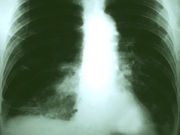Increased risk with new-onset depression, persistent depression, but not depression symptom remission
THURSDAY, Oct. 6, 2016 (HealthDay News) — Longitudinal changes in depression are associated with differences in mortality among patients with lung cancer, according to a study published online Oct. 3 in the Journal of Clinical Oncology.
Donald R. Sullivan, from the Oregon Health & Science University in Portland, and colleagues conducted a prospective, observational study from five U.S. geographically defined regions. They examined longitudinal changes in depression using the eight-item Center for Epidemiologic Studies Depression scale, which was administered at diagnosis and 12-month follow-up, and the impact of these changes on survival.
The researchers found that 38 percent of the 1,790 participants had depression symptoms at baseline, and during treatment an additional 14 percent developed new-onset depression symptoms. Based on longitudinal changes in depression symptoms from baseline to follow-up, participants were classified into four groups: never depression, new-onset depression, depression symptom remission, and persistent depression. Compared with the never-depression group, the hazard ratios were 1.50 (95 percent confidence interval [CI], 1.12 to 2.01), 1.02 (95 percent CI, 0.79 to 1.31), and 1.42 (95 percent CI, 1.15 to 1.75) for new-onset depression symptoms, depression symptom remission, and persistent depression symptoms, respectively. Depression symptoms at baseline correlated with increased mortality among participants with early- but not late-stage disease.
“Among patients with lung cancer, longitudinal changes in depression symptoms are associated with differences in mortality, particularly among patients with early-stage disease,” the authors write.
One author disclosed financial ties to Novartis, and a second disclosed ties to UpToDate.
Copyright © 2016 HealthDay. All rights reserved.








